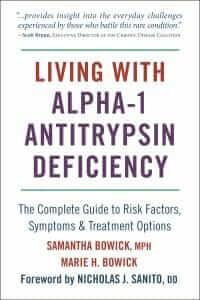November is Alpha-1 Antitrypsin Deficiency (A1AD) Awareness Month. Author Samantha Bowick has written several articles revolving around important questions and information about A1AD. She is the co-author of Living with Alpha-1 Antitrypsin Deficiency.
Why is Alpha-1 Antitrypsin Deficiency Awareness Month so Important?
Alpha-1 antitrypsin deficiency (A1AD) is an illness that at least 100,000 Americans have been diagnosed with it. There could be more people suffering with it who aren’t aware they are or what it is. It occurs when the liver doesn’t release enough alpha-1 antitrypsin protein, which helps the lungs function properly. With low levels of the protein, lung illnesses and liver disease are more likely to occur.
A1AD is a disability as it can affect oxygen saturation levels and the respiratory system. Symptoms that can be present with A1AD include shortness of breath, chronic respiratory infections with or without mucous, low oxygen saturation levels, a large decrease in lung function in a small amount of time, as well as others. Illnesses that can accompany A1AD or be diagnosed instead of A1AD include: chronic obstructive pulmonary disease, emphysema, asthma, as well as others. Those who smoke are more likely to show signs of alpha-1 than those who don’t smoke with the illness. It is a genetic disease meaning that it runs in families. However, just because one sibling has it, doesn’t mean all siblings will have alpha-1.
Augmentation therapy given by infusion is the treatment for alpha-1; there is no cure. Inhalers, nebulizers, and supplemental oxygen can be prescribed to help combat symptoms like shortness of breath.
Here are five reasons A1AD Awareness Month is so important:
1. It can bring all of us together who suffer with A1AD, which oftentimes leaves us isolated because it’s so rarely diagnosed and we don’t know anyone else with it.
2. We are louder in numbers. The more people we have talking about A1AD, the better.
3. We can reach people who don’t know what A1AD is and make sure they receive the correct information, especially if they think they may have it.
4. We want the medical community to know we aren’t backing down!
5. We can let people know they aren’t alone in their symptoms.
A1AD awareness is extremely important no matter what day or month of the year it is. When we ban together, we are more likely to be heard. I encourage you to talk to others and tell your story. Maybe it will lead to someone being diagnosed who otherwise wouldn’t have been and would have been suffering and not known why.
For more articles and information on A1AD, please click here.

Samantha Bowick has a Master of Public Health degree from Liberty University. She received a Bachelor of Science degree in Health Care Administration at Columbia Southern University. She is devoted to using her education and experiences to advocate for women who suffer with endometriosis and other chronic illnesses. She is the author of Living with Endometriosis. She currently lives in Aiken, South Carolina.
Marie H. Bowick has lived in Aiken, South Carolina her entire life, and was diagnosed with A1AD at 46 years old. She has been married for 27 years and is the mother of two daughters. She worked in manufacturing for 15 years and then became a caregiver to her mother, father, and youngest brother.





